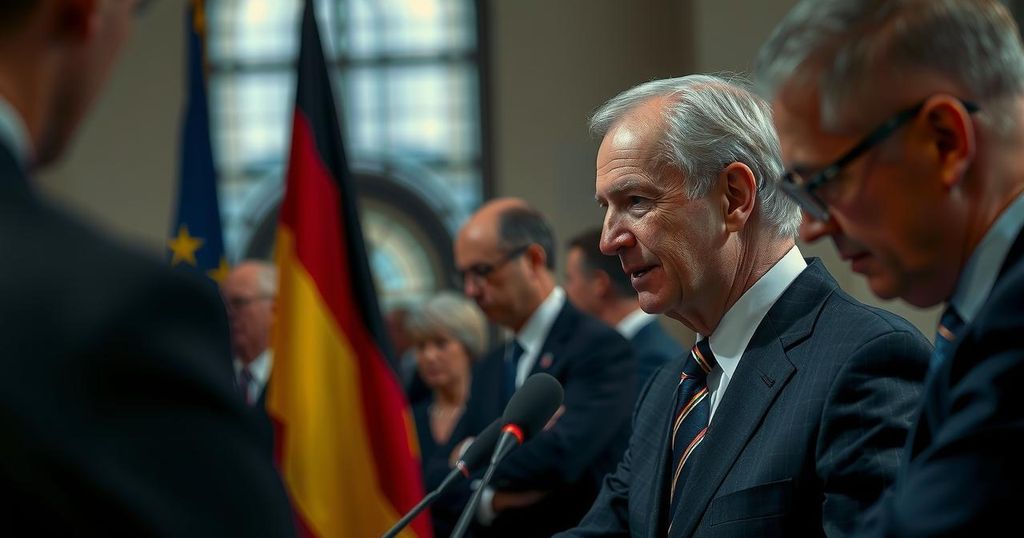Biden’s European Engagement: Upholding Alliances Amidst Geopolitical Uncertainty
President Biden’s recent trip to Europe aimed at reinforcing U.S. support for Ukraine and pursuing peace in Gaza. The visit involved discussions with European leaders regarding the impact of the upcoming U.S. presidential election on transatlantic relations, particularly concerning former President Trump’s potential return to power, which raises concerns about the future of NATO and international alliances. Biden was honored in Berlin and maintained a strong stance on the urgent need for a cease-fire in Gaza after the death of Hamas leader Yahya Sinwar, which he suggested could be a turning point for peace efforts.
President Joe Biden embarked on a significant trip to Europe to reinforce the United States’ commitment to supporting Ukraine and fostering peace in the Middle East. His engagements included meetings with prominent leaders such as German Chancellor Olaf Scholz, French President Emmanuel Macron, and UK Prime Minister Rishi Sunak. In what is likely his final European visit as president, Biden emphasized the unity required among the United States and its European allies, particularly against the backdrop of the upcoming presidential election in the United States. The potential return of former President Donald Trump to office raises concerns regarding the precarious state of U.S.-European relations. Trump, who is set to face Vice President Kamala Harris in the November 5 election, has historically exhibited a contentious stance towards European alliances, questioning their relevance and advocating less robust support for mutual defense obligations. German President Frank-Walter Steinmeier expressed his appreciation for Biden’s efforts, remarking that Europe’s reliance on American support has never been more critical. He articulated, “In the months to come, I hope that Europeans remember America is indispensable for us, and I hope that Americans remember your allies are indispensable for you.” Biden was honored with the Grand Cross Special Class by Germany, a recognition reserved for remarkable contributions to peace and diplomacy, a distinction previously awarded to only one other U.S. president, George H.W. Bush. This honor was a reflection of the strong partnership and common values between Germany and the U.S. In relation to the escalating violence in the Middle East, Biden reaffirmed his call for a cease-fire in Gaza, especially following the elimination of Hamas leader Yahya Sinwar, an event that occurred while he was en route to Germany. Both he and Chancellor Scholz acknowledged this moment as potentially pivotal in advancing peace efforts in the region, with Scholz stating that Germany also sees “a tangible prospect of a ceasefire in Gaza.” The discussions between Biden and his counterparts primarily centered on crucial issues, including the ongoing conflict in Ukraine, and further details of the situation are to be discussed with Macron and Starmer following Biden’s meetings with Scholz. Biden is set to make his return to the United States later in the day.
The backdrop of President Biden’s European visit is marked by significant geopolitical tensions, with the war in Ukraine and the ongoing conflict in Gaza at the forefront of international concerns. This visit represents an opportunity for Biden to consolidate support among European allies while highlighting the importance of transatlantic unity against adversarial actions from Russia and the implications of Hamas’s violent operations. Furthermore, the proximity of the U.S. presidential election injects an element of uncertainty into the discussions, particularly regarding future foreign policy direction should former President Trump return to power, given his historically critical stance towards NATO and European partnerships.
In conclusion, President Biden’s European trip underscores the urgency of maintaining robust international alliances in the face of geopolitical threats and impending electoral shifts. His advocacy for peace in the Middle East and unwavering support for Ukraine reflect a commitment to pivotal diplomatic endeavors, as leaders navigate the complexities of a changing global landscape. The discussions particularly underscore the imperative nature of U.S.-European cooperation in addressing shared challenges, despite the electoral uncertainties ahead.
Original Source: www.usatoday.com




Post Comment